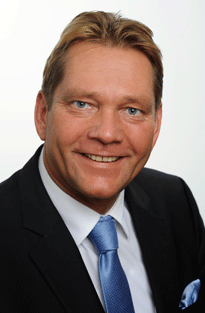
 The
Frankfurt-based general sales agent expects 2012 to be a tough year
for the global cargo industry due to weak markets, financial instabilities,
incalculable political risks, rising energy costs, and the ongoing European
crisis. Despite these critical external circumstances, however, ATC’s
CEO, Ingo Zimmer, is confident that his agency will notably increase
its turnover and financial results in the twelve months ahead compared
to “the very successful outcome we achieved in 2011.” The
Frankfurt-based general sales agent expects 2012 to be a tough year
for the global cargo industry due to weak markets, financial instabilities,
incalculable political risks, rising energy costs, and the ongoing European
crisis. Despite these critical external circumstances, however, ATC’s
CEO, Ingo Zimmer, is confident that his agency will notably increase
its turnover and financial results in the twelve months ahead compared
to “the very successful outcome we achieved in 2011.”
“We expect our enterprise to generate
further business due to new airline contacts, and also to the additional
frequencies that some of our carriers have put into the market, providing
more capacity that we can fill with air freight,” says an optimistic
Herr Zimmer.
It all started in 1971 in Switzerland,
when ATC Aviation Services was introduced. At that time, forwarders
and airlines hardly knew what a cargo general sales agent was. ATC was
a pioneer and trailblazer, paving the way for other contenders to step
into this business.
Since then, the company has generated
an annual turnover of more than 250 million euros. In some markets,
says CEO Zimmer, “we rank among the top players in terms of uplifted
tonnage.”
One example is Switzerland, where ATC
accounts for nearly the same air freight volume that home carrier Swiss
WorldCargo is transporting annually. Germany is another stronghold.
There, Zimmer and his team are responsible for filling the cargo compartments
or main decks of some fifteen capacity providers, among them All Nippon
Airways, Ethiopian Airlines, Etihad Airways, Royal Air Maroc. All across
Europe, more than 60 airlines rely on ATC’s cargo services, with
some agreements being valid in only one country, says Ingo. Finnair’s
contract for the Belgian market and the GSA’s representation of
Air China in Switzerland are just two examples that illustrate these
sorts of local agreements.
Looking back, Zimmer says that joining
ATC more than 20 years ago “was the best decision I have ever
made.” Europe’s GSA landscape then was still in its infancy,
with airlines considering the few players as barely qualified. “In
those days, we all had a severe image problem,” Ingo recalls.
The local managements of some airlines fostered this attitude, “because
they considered the general sales agents as representing a loss of their
influence and even a threat to their existence.”
Mounting cost pressures, however, increasingly
forced the carriers to rethink their strategy. Consequently, cargo sales
agents were no longer regarded as interlopers, but as necessary business
partners instead.
“We all were in a gold-rush mood
in those days,” he says. Dozens of start-ups popped up like mushrooms
and stepped into the sales business, although some of them only had
unrealistic ambitions and poor market knowledge.
Currently, an estimated two-dozen sales
agencies are operating in Germany; the majority, however, act as niche
players or regional agents. This is mainly because of financial reasons,
since letters of credit, IT and labor costs for qualified staff are
a big burden that not everybody can easily shoulder. “This is
quite impossible for small local operators,” Zimmer confirms.
In contrast, there are the big boys like
his ATC, the ECS group, Air Logistics and Kales. These four are Europe’s
top dogs who call the shots and are considered first adoptees by the
capacity providers. They benefit from a general trend in aviation that
long-haul passenger services are increasingly complemented by freighter
flights. More main deck capacity means higher loads and revenues. A
typical example, says Ingo, is Abu Dhabi-headquartered Etihad, which
offers passenger flights to Frankfurt, Munich and Dusseldorf and in
addition deploys A330 freighters four times weekly to Frankfurt-Hahn
airport. “These flight offerings provide us many uplift possibilities.”
A key success factor for ATC was its decision,
made some years ago, to follow their customer airlines and expand globally
by establishing offices in India and South Africa. “The next markets
on our agenda are South and North America,” Ingo announces.
For the years ahead, Ingo expects consolidation
to accelerate, leaving only two or three global GSA groups in the market.
He has no doubt that his enterprise will be one of them.
Heiner Siegmund/Flossie
|



